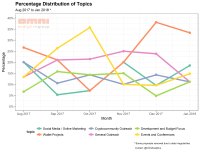OmniAnalytics
New member
Overview and Problem Statement
Our proposal seeks to fulfill an information gap within the DASH community by performing statistical analysis on the DASH governance system and the proposals submitted for deliberation.
*This work has since been resubmitted as a research project. We thank those who provided feedback!*
Our proposal seeks to fulfill an information gap within the DASH community by performing statistical analysis on the DASH governance system and the proposals submitted for deliberation.
*This work has since been resubmitted as a research project. We thank those who provided feedback!*
Last edited:

